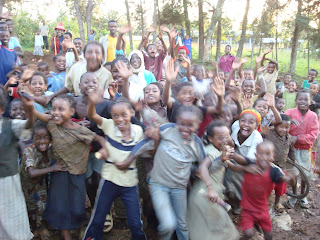Get Paid $30,000 to Have Three Kids!
>> July 19, 2010
Coming from a two child family, I was always amazed by large families. My best friend from childhood was eventually to become the eldest out of nine. The elder children were expected to help their parents in caring for their younger siblings and were responsible for household chores. The children grew up to possess exceptional tolerance and consideration and awareness of other people. One of the most incredible thing about this family was (and still is) the depth of the love for each and every child, and how carefully each child was raised to be caring, generous, responsible, and kind people. Although issues of overpopulation and dwindling resources fuel many debates against prolific childbearing, this amazing family shows another form of action and awareness. Which is the more responsible action? To be childless by choice or by sacrifice? Or to raise conscientious, educated, thoughtful, and engaged children. I don’t have an answer that is appropriate for all, but in most things, a balance is most likely the most appropriate solution.
As we travel, one of the first questions that people ask are, “do you have children?” Depending on where we are, our reply generates a variety of responses.
In China, where overpopulation is a major concern, many couples are allowed to have only one child. Exceptions are made for rural areas (when the child is a girl), ethnic minorities, and when parents have a child illegally (without the official papers that are mandatory for school enrollment, health care, etc), or when they pay a large fine to have another. I think that families who adopt the orphaned children of relatives are exempt from this law, as are families whose sole child dies before the age of eighteen. Twins are allowed.
In China, where overpopulation is a major concern, many couples are allowed to have only one child. Exceptions are made for rural areas (when the child is a girl), ethnic minorities, and when parents have a child illegally (without the official papers that are mandatory for school enrollment, health care, etc), or when they pay a large fine to have another. I think that families who adopt the orphaned children of relatives are exempt from this law, as are families whose sole child dies before the age of eighteen. Twins are allowed.
cousins in Yangshuo, China
As a result of the restrictions on children, China is absolutely child crazy. Huge theme parks and playgrounds and toy stores and baby clothing shops are clear indications of how spoiled Chinese children are. They are overly cherished, but with just reasons…can you understand why?
Once past the age of menstruation, Chinese women are required to visit a doctor every three months. If at the time of the visit, they are found to be pregnant, they are heavily encouraged to have an abortion. Whether or not the woman is pregnant, she is heavily pressured to use birth control. When we told the Chinese that we didn’t have children, they were confused and hurt. Why wouldn’t a healthy couple, with obvious wealth, and no laws on childbearing, be bereft of children? It may have been a slap in the face.
In Ethiopia, we met large families with many children. Ethiopia still has a large agricultural and animal-raising culture; many hands make lighter work. I was amazed to see a three-year old shepherds, striding across a vast plain at the heels of immense and bright white cows with broad horns, occasionally whacking them with a stick. Children in Ethiopia (as well as in many other cultures) possess remarkable self-confidence and self-assurance - they are conscious of their valued role in the family.
a village of friends in Kemba, Ethiopia
There are several places in the world where overpopulation is not a concern; actually, the opposite is true. Population decline is impacting Japan, Russia, most of eastern Europe, and Italy. Other countries are not far behind. The incentives offered by the government in some of these countries is astounding. The Republic of Singapore offers parents $3,000 for the first child, $9,000 in cash and savings for the second; and up to $18,000 each for the third and fourth!
In India, the gender gap is immense. Sex-selective abortion, as well as female infanticide are critical issues that will continue to impact the population of India, and have created a huge population of missing women in Asia. boys do not require an expensive dowry to be paid out, nor do they leave the family to live with the in-laws. I couldn’t say that the worth of children is lessened in India than in other cultures; however, with a very large population, extreme poverty, low standards of health and cleanliness, life is more tenuous in India. Estimates predict that by 2020, there could be an excess of 25 million men in India, instead of a natural, biological gender balance. Similar estimates are predicted for China.
In India, the gender gap is immense. Sex-selective abortion, as well as female infanticide are critical issues that will continue to impact the population of India, and have created a huge population of missing women in Asia. boys do not require an expensive dowry to be paid out, nor do they leave the family to live with the in-laws. I couldn’t say that the worth of children is lessened in India than in other cultures; however, with a very large population, extreme poverty, low standards of health and cleanliness, life is more tenuous in India. Estimates predict that by 2020, there could be an excess of 25 million men in India, instead of a natural, biological gender balance. Similar estimates are predicted for China.
students from a girls school in Ahmednagar, India
I have a good friend who has made a choice not to have children; she feels that in this modern world, it is the most responsible decision. I appreciate her candor and honesty and recognition of how privileged she is to be able to see children as a choice, rather than a necessity or obligation or powerless consequence. Perhaps not the right decision for all, but ask yourself: do I have the power and the right to make that decision? Could I make that decision out of sacrifice? Not all people reading this blog can answer yes. Think on that and read more about Childfree by Choice.
Other topics that will not be covered in this (already lengthy) blog are: discrimination against women/couples who choose not to have children; adoption; same-sex parenting; late life parenting; etc. Too many topics for one amateur blogger. I only write what I have learned and deduced from my own life and travels. But feel free to share your links or thoughts and add additional information as applicable.
I hope that this blog has given you a chance to think and reflect on your own positions of children. Each person is entitled to their own views and beliefs, but I believe greatly in the power of perspective.




.jpg)


0 comments:
Post a Comment